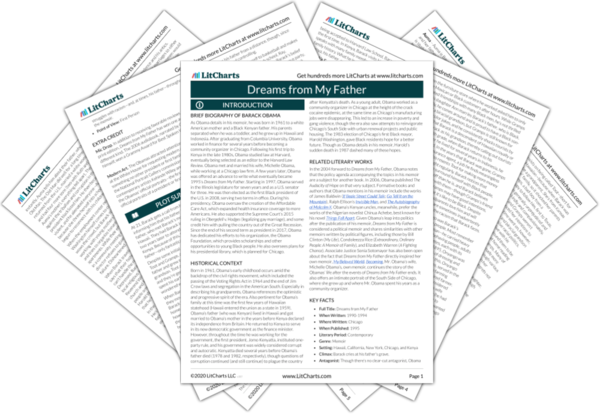Ann Quotes in Dreams from My Father
Chapter 1 Quotes
In the end I suppose that’s what all the stories of my father were really about. They said less about the man himself than about the changes that had taken place in the people around him, the halting process by which my grandparents’ racial attitudes had changed. The stories gave voice to a spirit that would grip the nation for that fleeting period between Kennedy’s election and the passage of the Voting Rights Act: the seeming triumph of universalism over parochialism and narrow-mindedness, a bright new world where differences of race or culture would instruct and amuse and perhaps even ennoble.
Chapter 4 Quotes
White folks. The term itself was uncomfortable in my mouth at first; I felt like a non-native speaker tripping over a difficult phrase. Sometimes I would find myself talking to Ray about white folks this or white folks that, and I would suddenly remember my mother’s smile, and the words that I spoke would seem awkward and false.
“I don’t suppose he would have. Stan doesn’t like to talk about that part of Kansas much. Makes him uncomfortable. He told me once about a black girl they hired to look after your mother. A preacher’s daughter, I think it was. Told me how she became a regular part of the family. That’s how he remembers it, you understand—this girl coming in to look after somebody else’s children, her mother coming to do somebody else’s laundry. A regular part of the family.”
Chapter 14 Quotes
That was one of the lessons I’d learned these past two and a half years, wasn’t it?—that most black folks weren’t like the father of my dreams, the man in my mother’s stories, full of high-blown ideals and quick to pass judgment. They were more like my stepfather, Lolo, practical people who knew life was too hard to judge each other’s choices, too messy to live according to abstract ideals.

Ann Quotes in Dreams from My Father
Chapter 1 Quotes
In the end I suppose that’s what all the stories of my father were really about. They said less about the man himself than about the changes that had taken place in the people around him, the halting process by which my grandparents’ racial attitudes had changed. The stories gave voice to a spirit that would grip the nation for that fleeting period between Kennedy’s election and the passage of the Voting Rights Act: the seeming triumph of universalism over parochialism and narrow-mindedness, a bright new world where differences of race or culture would instruct and amuse and perhaps even ennoble.
Chapter 4 Quotes
White folks. The term itself was uncomfortable in my mouth at first; I felt like a non-native speaker tripping over a difficult phrase. Sometimes I would find myself talking to Ray about white folks this or white folks that, and I would suddenly remember my mother’s smile, and the words that I spoke would seem awkward and false.
“I don’t suppose he would have. Stan doesn’t like to talk about that part of Kansas much. Makes him uncomfortable. He told me once about a black girl they hired to look after your mother. A preacher’s daughter, I think it was. Told me how she became a regular part of the family. That’s how he remembers it, you understand—this girl coming in to look after somebody else’s children, her mother coming to do somebody else’s laundry. A regular part of the family.”
Chapter 14 Quotes
That was one of the lessons I’d learned these past two and a half years, wasn’t it?—that most black folks weren’t like the father of my dreams, the man in my mother’s stories, full of high-blown ideals and quick to pass judgment. They were more like my stepfather, Lolo, practical people who knew life was too hard to judge each other’s choices, too messy to live according to abstract ideals.











